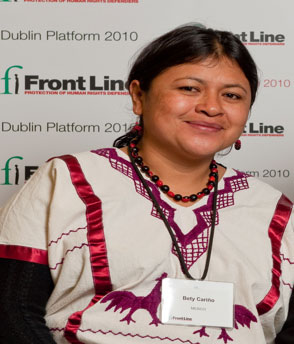On 27 April 2010 indigenous rights defender Bety Carino and Finnish international observer Jyri Antero Jaakkola, were shot dead when a peaceful solidarity caravan of human rights defenders came under fire as it tried to enter the autonomous indigenous municipality of San Juan Copala which had been occupied by a government backed paramilitary group.
At approximately 14:40, a humanitarian group made up of 30 human rights defenders as well as international observers were on their way to attempt to enter San Juan Copala in order to deliver provisions to indigenous communities who were under siege by armed groups.
As they entered the community of La Sabana, a town reportedly controlled by paramilitary organisation Unión de Bienestar Social de la Región Triqui UBISORT (Social Welfare Union of the Triqui Region), their vehicles came under fire. Beatríz Alberta (Bety) Cariño Trujillo, of the Centro de Apoyo Comunitario Trabajando Unidos CACTUS (Centre for Community Support Working Together), and Jyri Antero Jaakkola, an international observer from Finland, were both killed in the attack.
Another member of the group, Mónica Citlali Santiago Ortiz, was injured in the attack but was able to get to a hospital for medical attention. Those who did not escape and who remained in the vehicles were interrogated by the paramilitaries. Some have reported receiving death threats prior to being released.
The human rights organisations were attempting to enter San Juan Copala to provide support to the local community who had been without electricity, water, medical access and basic provisions as a result of the ongoing paramilitary blockade. Schools had also been shut down.
The caravan of observers included individuals from Finland, Italy, Belgium and Germany, members of the CACTUS, VOCAL, Asamblea Popular de los Pueblos de Oaxaca APPO (Popular Assembly of the Peoples of Oaxaca, the Red de Radios y Comunicadores Indígenas del Sureste Mexicano (Network of Indigenous Radio Stations and Broadcasters of the Southeast of Mexico), as well as a group of teachers from the municipality who had been unable to give classes.
The violent attack was directly linked to the peaceful activities of those national and international individuals as they attempted to defend the rights of the local communities affected in areas controlled by paramilitary groups.
INVESTIGATION
The case is still pending. As of June 2015 3 people have been arrested and there are outstanding warrants for the arrest of another 10 suspects. However, despite a public statement by the President of Mexico that the government is committed to bringing the perpetrators to justice, both the husband and lawyer of Bety Carino complain of a lack of political will to make this happen. They have also complained of the authorities failure to protect witnesses. Those who have been leading the campaign for justice for Bety Carino and Jyri Antero Jaakkola have received threatening phone calls telling them to give up the case or face the consequences.
Speaking at a 2015 event to mark the 5th anniversary of the killings, Bety’s sister Carmen Trujillo said “As usual we have have had no reply from the authorities. We have believed for a long time that the justice system in this country is in crisis. Who can we now turn to for justice unless to the actual killers. That isn’t justice. Five years on from the killing of Jyri and Bety we still haven’t had a reply. Some people have been arrested but that doesn’t mean that the issue has been fundamentally resolved »
